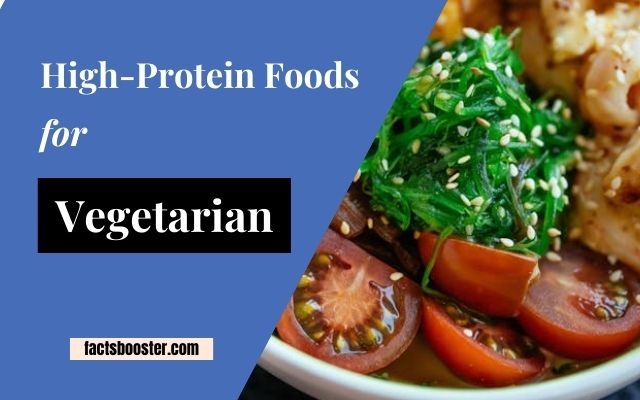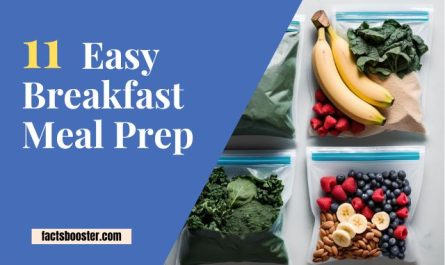We will talk about high-protein foods for vegetarian in this article. Vegetarian or vegan diet can feel like navigating a new world of nutrition, especially when it comes to protein. You’ve probably heard it a thousand times — protein is crucial for muscle repair, energy levels, and overall health.
But how do you ensure you’re getting enough without meat? That’s where high-protein vegetarian foods come into play. From the essential role of plant-based protein to the nutritional balance it brings, let’s dive deeper into how to sustain your body and health on a vegetarian diet.
Key Takeaways:
- Understanding Plant-Based Proteins: It’s crucial for vegetarians to find reliable protein sources.
- Health Benefits: Protein from plants offers a balanced and health-focused approach to a vegetarian diet.
- Discovering High-Protein Foods: This article will guide you through an array of vegetarian-friendly, high-protein foods.
The Importance of High-Protein Foods in a Vegetarian Diet

A vegetarian or vegan diet brings a whirlwind of health benefits, yet it also introduces the challenge of finding adequate protein sources. You might wonder, How can I sustain energy, support muscle repair, and ensure overall health without meat?
This is where the brilliance of high-protein vegetarian foods shines through. Incorporating nutrient-rich options like lentils, quinoa, and edamame into your meals not only fuels your body with essential amino acids for muscle repair but also keeps your energy levels steady throughout the day.
It’s a shift that calls for creativity and commitment, but the rewards for your health and the planet are immense. Taking this step means you’re not just eating, you’re nourishing every part of yourself with thoughtfulness.
High-Protein Foods for Vegetarian
Embarking on a vegetarian or vegan diet doesn’t mean you’ll struggle to meet your protein needs. Let’s dive into the world of high-protein vegetarian foods that not only pack a nutritional punch but also add variety and flavor to your meals. Here’s a list to get you started:
- Non-Dairy Milk – A refreshing alternative to traditional milk
- Dairy-Free Yogurt – Perfect for gut health without the dairy
- Unsweetened Cocoa Powder – For a guilt-free chocolatey boost
- Lentils – A powerhouse of protein and fiber
- Edamame beans – Deliciously green and protein-rich
- Soy Products: Tofu, Tempeh – Versatile staples of a vegan diet
- Seeds: Pumpkin seeds, Chia Seeds, Sunflower seeds, Sesame – Tiny but mighty sources of protein
- Chickpeas – Great for salads, stews, and spreads
- Almonds – A crunchy, nutritious snack
- Kidney beans – Filling and rich in protein
- Garden peas – Sweet, green orbs of goodness
- Pistachios, Cashews – Perfect for on-the-go snacking
- Wild rice – A protein-packed grain alternative
- Black beans – Ideal for hearty meals
- Quinoa – A complete protein and grain substitute
- Oats – For a warm, comforting start to your day
- Broad beans – An often overlooked, high-protein legume
- Wheatgerm – A nutrient-dense addition to any meal
- Hemp seeds – For a protein and omega boost
Read more:
Legumes and Beans
Don’t overlook the powerhouses that are legumes and beans. Lentils, for instance, are not just versatile but pack about 18 grams of protein per cooked cup, making them stellar for muscle repair and energy boosts.
Chickpeas follow closely, offering around 15 grams of protein per cup, alongside fiber for digestive health. Lastly, black beans stand out with roughly 15 grams of protein per cup, plus antioxidants that support heart health.
Integrating these into your diet can significantly enhance your protein levels, essential for vegetarians seeking nutritional balance.
Dairy-Free Alternatives
These alternatives not only keep you aligned with a vegetarian or vegan lifestyle but also introduce a variety of flavors to your diet. For example, almond milk provides an interesting nutty taste, while coconut milk adds a creamy texture to smoothies and coffee.
Switching to a vegetarian diet doesn’t mean you have to miss out on protein. In fact, dairy-free alternatives like almond milk, soy yogurt, and coconut milk offer substantial protein content to help meet your nutritional needs.
Each serving of these dairy-free products contributes significantly to your daily protein intake, ensuring you don’t fall short on this essential nutrient. Embracing these options benefits your health, while also adhering to ethical and environmental principles associated with vegetarianism.
Nuts and Seeds
Exploring the world of vegan diet essentials, you’ll find that nuts and seeds are nothing short of miraculous. Not only are they deliciously versatile, but their health benefits are immense. Take almonds, for instance, a powerhouse of protein that not only boosts your energy levels but also supports muscle repair. And then there’s chia seeds, tiny in size but massive in protein content, they’re a fantastic addition to your diet, keeping you fuller for longer.
Let’s not forget pistachios, providing that perfect crunch, they’re not just a treat for your tastebuds but also a great source of protein to keep your energy soaring throughout the day.
Incorporating these high-protein vegetarian foods into your meals isn’t just a step towards a healthier lifestyle; it’s a leap towards a more energetic, vibrant you.
Soy Products and Other Plant-Based Proteins
Turning to soy products like tofu and tempeh can be a game-changer for you on a vegetarian diet. Not only are these options packed with high-quality protein, but their versatility in meals is nothing short of amazing.
Tofu, for instance, can effortlessly absorb any flavor you cook it with, making it a perfect canvas for your culinary experiments.
Tempeh, with its nutty flavor, offers a texture that’s ideal for heartier dishes. These plant-based proteins are not just about keeping your diet diverse; they’re about ensuring you’re fueled and ready to tackle whatever comes your way.
With tofu and tempeh, hitting your protein goals is not just possible; it’s deliciously attainable.
How to Get 100g Protein Without Meat
Wondering how you can meet your protein needs without meat? Let’s dive into how you can effortlessly reach 100g of protein per day on a vegetarian diet.
- Start your day with a protein-packed smoothie: Blend dairy-free yogurt or non-dairy milk with unsweetened cocoa powder, hemp seeds, and a scoop of plant-based protein powder.
- For lunch, experiment with a hearty salad: Toss together chickpeas, quinoa, almonds, and an assortment of your favorite veggies.
- Snack smart on edamame beans or a mix of nuts like pistachios and cashews to keep your energy levels up.
- Dinner could be a savory stir-fry featuring tofu or tempeh alongside a generous serving of lentils or black beans for an extra protein kick.
By incorporating these foods into your vegetarian diet, you’ll see how simple it is to hit that 100g protein goal every day.
Protein-Packed Recipes for Every Meal
Imagine starting your day with a steaming bowl of Quinoa Porridge, topped with almond slices and a drizzle of dairy-free yogurt for that perfect morning boost.
Yes, breakfast can be both delectable and rich in protein, setting a positive tone for the rest of your day. Moving onto lunch, why settle for anything mundane when you can enjoy a vibrant Chickpea and Avocado Salad, tossed with an array of fresh veggies and sprinkled with sesame seeds?
It’s a flavorful journey that promises to refuel your body. As dusk falls, end your day on a high note with Lentil and Tempeh Stew; a comforting, hearty dish that not only warms your heart but also packs a protein punch, ensuring you’re perfectly nourished.
Simple, yet remarkable recipes to sustain you through every meal.
Benefits of Plant-Based Protein
Choosing a diet rich in high-protein vegetarian foods not only benefits your health but also supports a larger, more compassionate world.
By focusing on plant-based proteins like lentils, quinoa, and tempeh, you’re taking a stand for animal welfare, reducing the demand for animal-based products that are often associated with unethical treatment and conditions.
Additionally, plant-based diets have a significantly lower environmental impact. They require less water, land, and energy to produce, while substantially reducing carbon footprints compared to meat-centric diets.
Switching to a vegetarian diet high in protein isn’t just about what’s good for you; it’s about making a positive impact on our planet and its inhabitants.
Bottom Line
The journey towards a high-protein vegetarian or vegan diet might feel daunting at first. But, here’s a thought – start small. Integrate a few of the high-protein vegetarian foods we’ve discussed – whether it’s lentils, tofu, or chia seeds – into your meals and gradually expand your palate. The variety and benefits of plant-based protein are vast, so let your curiosity lead the way and your diet flourish.
References:
1. Compr Rev Food Sci Food Saf, 2022 May, “Application of emerging technologies to obtain legume protein isolates with improved techno-functional properties and health effects” (1)
2. Food Res Int, 2023 Jul, “Dairy and plant based protein beverages: In vitro digestion behaviour and effect on intestinal barrier biomarkers” (2)
3. PubMed Central, 2023 Feb 23, “Composition of Nuts and Their Potential Health Benefits—An Overview” (3)
4. Compr Rev Food Sci Food Saf, 2021 Mar, “Tempeh: A semicentennial review on its health benefits, fermentation, safety, processing, sustainability, and affordability” (4)


